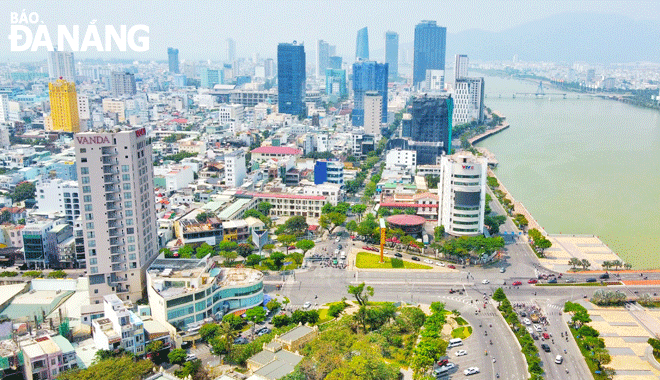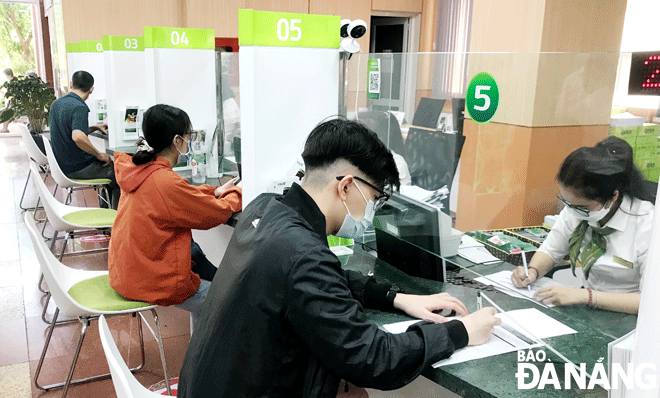Building financial centre associated with economic development orientation
Last March, the Da Nang People's Committee submitted a report to the Prime Minister proposing specific mechanisms and policies to form a regional financial centre in Da Nang. Accordingly, the regional financial centre will be a new approach in the development of Da Nang in the coming time to restructure the economy, promote growth and attract investment.
 |
| Da Nang aims to build a regional financial centre to anticipate the trend of shifting investment capital flows, promoting economic development. A corner of Da Nang center seen from above. Photo: XUAN SON |
Choosing the right development model
According to the announced draft project, Da Nang chooses a non-traditional financial centre model. Accordingly, Da Nang will see the formation of an offshore financial centre (OFC), which is defined as a “country or jurisdiction that provides financial services to nonresidents on a scale that is incommensurate with the size and the financing of its domestic economy”. OFC is a separate financial sector with open and highly competitive tax and supervisory regulations.
After 5-10 years (expected after 2030) or when Da Nang has certain development conditions, the city will support strategic investors to develop the centre into a regional financial centre (RFC), which can be defined as a central location where there is a high concentration of financial institutions and capital markets that allow financial transactions in the region to take place efficiently.
At that time, investors in the financial market can directly invest in the domestic market, not only in the financial sector but also in other economic fields.
With a non-traditional model, the industries operating in the financial market include 2 main groups of sectors: industries directly related to finance - banking and ancillary industries and utility services.
According to Dr. Huynh Huy Hoa, the Director of the Da Nang Institute for Socio-Economic Development, the two mentioned above groups of sections are associated with the tourism economic pillar as stipulated in Resolution No. 43/NQ-TW dated January 24, 2019 on the construction and development of Da Nang to 2030, vision towards 2045 adopted by the Politburo.
Specifically, the financial centre in Da Nang not only features financial activities but it also links with convenient activities and services such as resorts, conferences, entertainments to make the city a special and attractive destination for international tourists and investors.
The above-mentioned orientation is similar to financial centers in Singapore, Dubai (United Arab Emirates - UAE), thereby promoting the strengths of Da Nang, while creating a highlight and promoting the development to the tourism of Central Viet Nam, contributing to promoting the image of the region to the international tourism community.
In addition to tourism development, the financial centre in Da Nang also aims to create an environment for testing innovative solutions and technologies in financial activities, associated with the function of a national innovation centre which is taking the shape in Da Nang, thereby promoting the ability to meet the diverse needs of people and businesses in accessing modern financial services. This is also a goal set out by the Politburo in Resolution No. 43/NQ-TW.
 |
| Transaction activities at the Joint Stock Commercial Bank for Foreign Trade of Viet Nam (Vietcombank) - Da Nang Branch. Photo: M.QUE |
Building a roadmap and timeline
Regarding the timeline according to the draft project, Da Nang, as an economic center in the Central Viet Nam and Central Highlands regions will give priority to attracting strategic investors in the 2022 - 2024 period to take advantage of international resources and increase the feasibility of building an international financial centre (IFC) in Da Nang.
In the 2024 - 2030 period, the city will focus on completing the financial centre infrastructure and implementing the activities of an OFC.
In the period after 2030, when the domestic market has adapted to new financial activities, the OFC will gradually transform into RFC to expand opportunities for development and provide financial services to the domestic sector and a number of countries in the Asia-Pacific region.
In terms of space, Da Nang has a land fund of about 6.17ha for the development of the financial centre, including 5 plots of land in Son Tra District that has been planned to serve the establishment of a financial centre complex with favourable infrastructure.
In addition, the city is transforming the Da Nang Industrial Park with an area of more than 62ha into a business centre. This business center area will be combined, by My Khe coastal route, with the above-mentioned 6.17ha complex, forming a complete financial centre zone in terms of scale and development space.
In order for the financial centre to take shape soon, finance-banking expert Nguyen Xuan Hai with many years of studying and teaching in the U.S said that Da Nang needs to continue its efforts to promote the deployment and formation of infrastructure to serve financial organisations, create a dynamic and modern business environment, promote the spirit of innovation for financial institutions, and strengthen strategies for attracting qualified human resources and ensuring the supply of high-quality labour in the financial sector.
In particular, focus will be on strongly developing the local economy from the city’s internal resources of the city, building reasonable mechanisms and policies, creating an open environment to attract and effectively use investment capital from both home and abroad.
Director of the municipal Department of Finance Nguyen Van Phung said that the construction of a financial centre requires a careful calculation of factors affecting the locality based on the needs and the maximum exploitation of the local strengths.
Da Nang has also been improving many criteria on the business environment, implementing plans to promote digital transformation, building a smart city and developing high-quality human resources with a high foreign language ability.
With a vision towards 2045, Da Nang sets the goal of developing into an IFC and joining the network of IFC worldwide.
Reporting by MAI QUE - Translating by A.THU